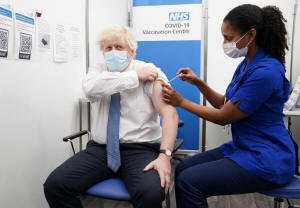UK study finds mRNA COVID-19 vaccines provide biggest booster impact
 Send a link to a friend
Send a link to a friend
 [December 03, 2021]
By Alistair Smout [December 03, 2021]
By Alistair Smout
LONDON (Reuters) -COVID-19 vaccines made by
Pfizer and Moderna that use mRNA technology provide the biggest boost to
antibody levels when given 10-12 weeks after the second dose, a new
British study has found.
The "COV-Boost" study was cited by British officials when they announced
that Pfizer and Moderna were preferred for use in the country's booster
campaign, but the data has only been made publicly available now.
The study found that six of the seven boosters examined enhanced
immunity after initial vaccination with Pfizer-BioNTech's vaccine, while
all seven increased immunity when given after two doses of AstraZeneca's
vaccine.
"A third dose will be effective for many of the vaccines we've tested
and in many different combinations," Professor Saul Faust, an
immunologist at the University of Southampton and the trial's lead, told
reporters.
The study, published late on Thursday, found that a full dose or half
dose of Pfizer or a full dose of Moderna gave a strong boost to both
antibody and T-cell levels, regardless of whether the person initially
received Pfizer or AstraZeneca.
"All four of the vaccination regimes most widely deployed in the UK lead
to essentially the same levels of immunity and are likely to be equally
effective," said Professor Eleanor Riley, immunologist at the University
of Edinburgh. She added that a policy change in booster gaps was also
supported by the data.
"These data support the JCVI (vaccine committee) decision earlier this
week to bring forward booster doses to 3 months after the second
vaccination."
[to top of second column]

|

Britain's Prime Minister Boris Johnson receives his coronavirus
booster vaccination at St Thomas Hospital in London, Britain
December 2, 2021. Paul Edwards/Pool via REUTERS

When AstraZeneca, Novavax, Johnson & Johnson and
Curevac were given as boosters, they increased antibody levels for
either initial vaccine, albeit to a smaller degree, the study found.
However, while Valneva boosted antibodies in people initially
vaccinated with AstraZeneca, it did not provide a boost for Pfizer.
The COV-Boost study pre-dated the spread of the emergent Omicron
variant of concern, and Faust said he had shared samples with the UK
Health Security Agency to generate data on Omicron.
The study did however find that booster shots also helped to
generate a broad T-cell response against the Beta and Delta
variants, which may play a key role in longer-term protection.
A separate study by Imperial College London into how initial
exposure to SARS-CoV-2 shapes immune responses, also published late
on Thursday, similarly found a good T-cell response to both Alpha
and Delta after infection followed by vaccination.
(Reporting by Alistair Smout;Editing by Bernadette Baum and Mark
Heinrich)
[© 2021 Thomson Reuters. All rights
reserved.] Copyright 2021 Reuters. All rights reserved. This material may not be published,
broadcast, rewritten or redistributed.
Thompson Reuters is solely responsible for this content. |